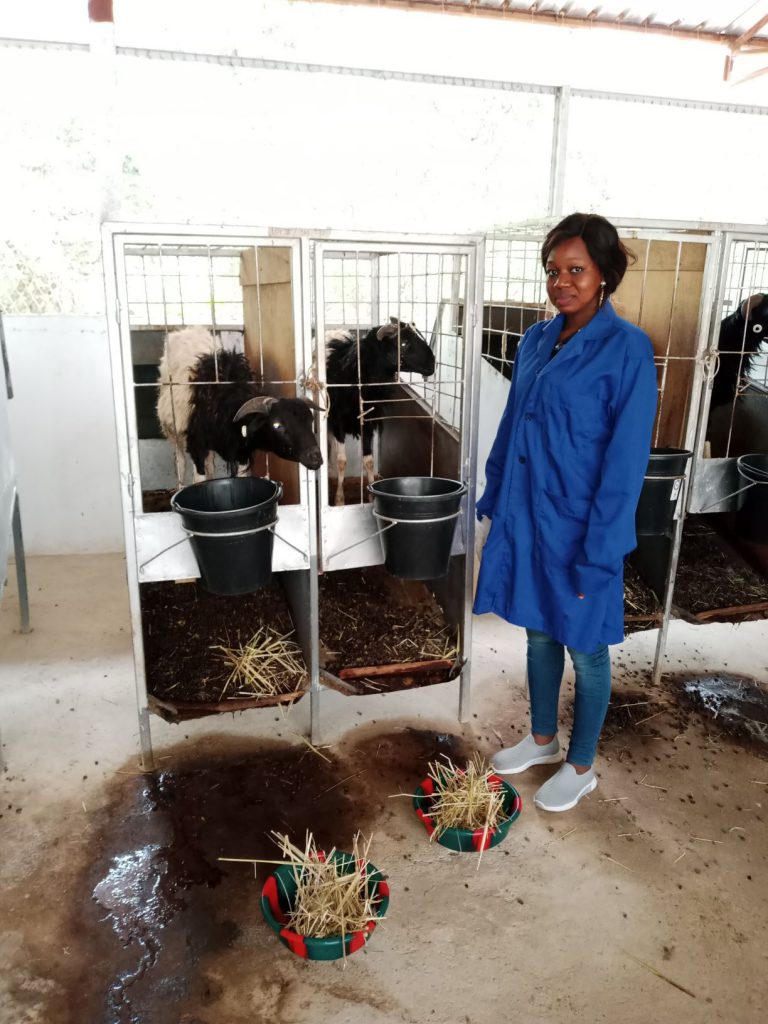Although livestock are known to contribute to greenhouse gases, not all livestock are the same. Systems for raising livestock vary widely from massive industrial operations to a family with one cow. In much of the developing world, the smallholder system predominates, and research may help to unravel its specific contributions to climate change.

To that end, researchers in western Africa, with Dr. Ermias Kebreab of the University of California-Davis, are collaborating on a project led by the Feed the Future Innovation Lab for Livestock Systems. The team has introduced a new method for studying greenhouse gases produced by goats and sheep. The C-Lock company’s GreenFeed machine in Burkina Faso, being used in Africa for the first time with small ruminants, is designed to capture emissions of methane (CH4), carbon dioxide (CO2), and optionally oxygen (O2) and hydrogen (H2) from individual animals.
Feeding Routine
Attracted by feed in a container in the stainless steel GreenFeed machine (see photo), each animal in the study approaches individually and is retained within a pen as it feeds for a specified amount of time. As the sheep or goat feeds, it also burps, and the machine measures its methane and carbon dioxide emissions and fluxes. Ruminants have complex digestive systems, which allow them to breakdown the tough cell walls of grasses and other plants, and a by-product of this process is waste gases like methane, which are expelled by burping.

The GreenFeed machine is located at a research station of the Institute of Environmental and Agricultural Research (INERA) in Farako-ba, in western Burkina Faso. This study is being conducted as part of the EQUIP Project, a five-year effort begun in 2017 and funded by the Bill & Melinda Gates Foundation and managed by the University of Florida’s Feed the Future Innovation Lab for Livestock Systems. The Equip project is implemented in Burkina Faso and Ethiopia by a consortium led by the University of Florida in collaboration with the University of California-Davis, International Livestock Research Institute, INERA, ACDI/VOCA, Ethiopian Institute of Agricultural Research, and Hawassa University. The project’s Feed Study subproject aims to increase quality feed supply for small ruminants in Burkina Faso and for dairy cattle in Ethiopia.
White and Black Sheep
Since April 2021, a feeding trial with 16 local sheep has been providing 4 different diets, with increasing levels of energy, to measure greenhouse gases and to estimate energy requirements of the Djalonké sheep breed. Knowing nutrient requirements of local breeds is important for the formulation of cost-effective, climate-smart, balanced diets for the practice of small ruminant fattening, which is an important economic activity for smallholder farmers in the Sahel region and particularly in Burkina Faso.
Results of this research are expected later this year. For more information, please contact livestock-lab@ufl.edu or visit the project webpage: https://livestocklab.ifas.ufl.edu/projects/feed-project/.
 1
1
